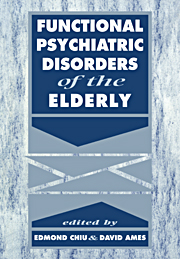Book contents
- Frontmatter
- Contents
- List of contributors
- Preface
- Introduction – A personal note
- Acknowledgement
- Part 1 Classification
- Part 2 General epidemiology
- Part 3 Neuroses
- Part 4 Affective disorders
- Part 5 Psychosexual disorders
- Part 6 Substance use and abuse
- Part 7 Schizophrenia and related psychoses
- Part 8 Psychological, biological and medical issues
- Part 9 Treatment methods
- 25 Geriatric psychopharmacology
- 26 Electroconvulsive therapy in later life
- 27 Family therapy
- 28 Group therapy in the elderly
- 29 Integrated psychotherapy of the elderly
- 30 Management of the treatment team in a multidisciplinary framework
- 31 Occupational therapy
- 32 Nursing management
- 33 Social work and the psychiatry of late life
- 34 Music therapy
- 35 Physiotherapy
- Part 10 Conclusion
- Index
34 - Music therapy
from Part 9 - Treatment methods
Published online by Cambridge University Press: 13 November 2009
- Frontmatter
- Contents
- List of contributors
- Preface
- Introduction – A personal note
- Acknowledgement
- Part 1 Classification
- Part 2 General epidemiology
- Part 3 Neuroses
- Part 4 Affective disorders
- Part 5 Psychosexual disorders
- Part 6 Substance use and abuse
- Part 7 Schizophrenia and related psychoses
- Part 8 Psychological, biological and medical issues
- Part 9 Treatment methods
- 25 Geriatric psychopharmacology
- 26 Electroconvulsive therapy in later life
- 27 Family therapy
- 28 Group therapy in the elderly
- 29 Integrated psychotherapy of the elderly
- 30 Management of the treatment team in a multidisciplinary framework
- 31 Occupational therapy
- 32 Nursing management
- 33 Social work and the psychiatry of late life
- 34 Music therapy
- 35 Physiotherapy
- Part 10 Conclusion
- Index
Summary
Introduction
There are several definitions for music therapy; the shortest runs thus: ‘…the planned use of music to reach nonmusical goals’. A longer definition describes music therapy as ‘… the planned use of music to improve the functioning in their environment of those with social, cognitive, emotional and/or physical disadvantage.’
Both of these indicate the nature of music therapy:
* It has potential uses in a very broad range of difficulties experienced by groups or individuals.
* It is based upon planning, which entails assessment of the patient(s)' needs.
* Assessment leads to the identification of individual or group goals.
* The music therapy intervention is planned in order to reach the goals identified in the assessment.
* On-going evaluation may lead to reappraisal of the goals and the treatment approach.
Tertiary educational programmes in music therapy are planned in accordance with the various principles outlined above, and involve both theoretical knowledge and practical skills.
Although some work in private practice in the community, music therapists commonly work as members of a team in a hospital, a clinic or in special education.
Music therapy differs from recreational music in the establishing of specific nonmusical goals. Thus in music therapy the music is not an end in itself but a means to an end. In recreational music there may be chance therapeutic benefits, as when a lonely individual finds friendship with members of a choir because of mutual interests, but these benefits are not the designated goal of the music activity. Music therapy, in contrast, has stated therapeutic goals for which the music is the facilitator.
- Type
- Chapter
- Information
- Functional Psychiatric Disorders of the Elderly , pp. 580 - 593Publisher: Cambridge University PressPrint publication year: 1994



